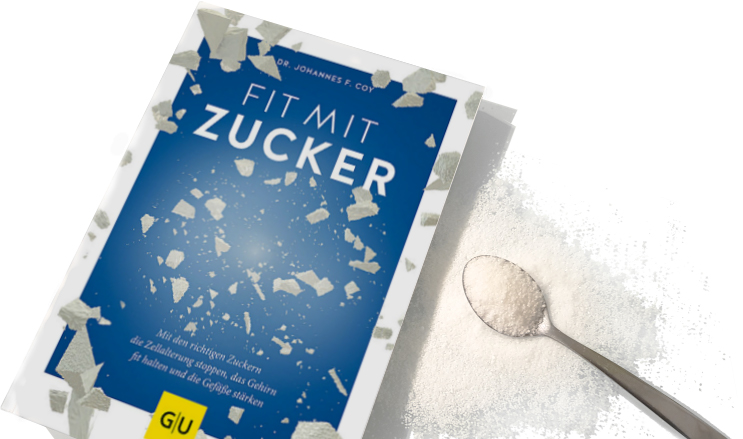Learn more about Dr. Coy and the creation of his sugar solutions.
Dr Johannes Coy is a world-renowned scientist whose research focuses on the health benefits of sugar awareness. Dr Coy has made a number of important genetic discoveries which change our understanding of cancer and nutrition and make him the leading expert on sugars.

Book: Fit with Sugar, by Dr Johannes Coy
Dr Coy has written several books about cancer nutrition. His latest book, Fit with Sugar, is now available. In this book, you’ll discover the evolutionary role of sugar in the human body. Consuming too much conventional sugar isn’t good for our health, but with the right sugars, we can stop cell ageing, keep the brain fit, protect against diseases and switch on fat burning. Find out how you can maintain physical and mental performance using natural low- glycaemic sugars and sugar substitutes. The book includes many delicious recipes for cakes, snacks and desserts, so you can implement a sugar-conscious diet easily and intelligently, without giving up sweet treats.
Buy the book: Cancer-Fighting Diet: Diet and Nutrition Strategies to Help Weaken Cancer Cells and Improve Treatment, by Dr Johannes Coy.
Research & Resources
Metabolic, hormonal and performance effects of isomaltulose ingestion before prolonged aerobic exercise: a double-blind, randomised, cross-over trial
This research study published in the Journal of the International Society of Sports Nutrition that looked at how taking isomaltulose (a low‑glycemic carbohydrate) before long aerobic exercise affects metabolism, hormones, and exercise performance compared with glucose and maltodextrin. In a double‑blind, randomized crossover trial, participants consumed different carbohydrates before prolonged aerobic exercise, and the researchers measured things like fat vs. carbohydrate use for energy, blood glucose, and hormones such as insulin and GIP. The goal was to see whether isomaltulose could change fuel use, hormonal responses, and performance outcomes during endurance exercise.
The effect of different sweeteners on the oral microbiome: a randomized clinical exploratory pilot study
The aim of the study was to evaluate the modulating effects of five commonly used sweetener (glucose, inulin, isomaltulose, tagatose, trehalose) containing mouth rinses on the oral microbiome.
Open AccessArticle Gut Hormones and Postprandial Metabolic Effects of Isomaltulose vs. Saccharose Consumption in People with Metabolic Syndrome
This study compared the effects of isomaltulose (a low–glycemic index sugar) with saccharose (regular sugar) on gut hormones and blood sugar responses in people with metabolic syndrome by giving each sugar before a meal and measuring how the body responded. Using a randomized crossover design with 15 participants, the researchers found that isomaltulose slowed the rise in blood glucose and led to higher, more sustained levels of hormones like GLP-1 and PYY—especially when consumed about three hours before a meal—compared with saccharose. These hormonal changes were linked to a stronger “second meal effect,” meaning better metabolic responses at the next meal, suggesting that isomaltulose might help manage post-meal glucose control in people with metabolic syndrome
Impact of Isomaltulose on Glycemic Response in Diabetic and Healthy Populations: A Meta-Analysis
This meta-analysis published in Nutrients analyzed data from multiple controlled studies to examine how isomaltulose, a low–glycemic index sugar, affects blood sugar levels compared with regular sugar (sucrose). The authors reviewed ten controlled studies involving 367 participants, including both individuals with and without diabetes. They found that isomaltulose resulted in lower blood glucose levels about one hour after consumption compared with sucrose, although the overall effect was modest.
Research Society for the Study of Diabetes in India (RSSDI) multidisciplinary expert consensus recommendations on role of oral fluid, electrolytes, and energy management in persons with diabetes
This article outlines a multidisciplinary expert consensus on optimizing fluid, electrolyte, and energy (FEE) management in individuals with diabetes, particularly during acute, non-diarrheal illnesses. Developed through a modified Delphi process, the consensus highlights a gap in current diabetes guidelines regarding tailored FEE strategies. Experts recommend incorporating slow-release carbohydrates such as isomaltulose, D-tagatose, and trehalose, as well as ready-to-drink formulations containing balanced fluids, electrolytes, and energy sources, to support stable glycaemia, hydration, and recovery. The paper advocates for integrating personalized FEE approaches into standard diabetes care to help prevent dehydration-related complications and improve metabolic outcomes.
All sugars are not alike: Isomaltulose better than table sugar for type 2 diabetes patients
Like sucrose (table sugar), the natural disaccharide isomaltulose (PalatinoseTM) consists of glucose and fructose, but it is apparently more suitable for people with type 2 diabetes with regard to regulating blood glucose levels. The favorable metabolic effect of isomaltulose is due to the almost opposing release profiles of the gut hormones GLP-1 and GIP, a new study shows.
Novel findings on the metabolic effects of the low glycaemic carbohydrate isomaltulose (Palatinose)
This study included three human intervention trials to investigate the physiological characteristics of isomaltulose (iso). The results showed that iso is effectively absorbed from the small intestine, regardless of the food matrix, and provides a prolonged delivery of blood glucose. It was found to have lower postprandial blood glucose and insulin responses compared to sucrose. Regular consumption of iso within a Western-type diet was well tolerated and did not affect blood lipids in individuals with hyperlipidemia. Although no significant differences were observed compared to sucrose after the 4-week intervention, iso shows promise as a carbohydrate option for individuals at risk of vascular diseases.
Ingesting isomaltulose versus fructose-maltodextrin during prolonged moderate-heavy exercise increases fat oxidation but impairs gastrointestinal comfort and cycling performance
This study examined the metabolic and performance effects of ingesting isomaltulose, a slowly absorbed carbohydrate, during exercise. The results showed that isomaltulose increased plasma nonesterified fatty acid concentration and fat oxidation while decreasing carbohydrate oxidation compared to fructose-maltodextrin supplementation. However, isomaltulose ingestion led to severe gastrointestinal symptoms and negatively affected exercise performance. These findings suggest that isomaltulose may not be suitable for prolonged or high-intensity exercise compared to other carbohydrate supplements.
Substrate Utilization and Cycling Performance Following Palatinose™ Ingestion: A Randomized, Double-Blind, Controlled Trial
This study compared the effects of isomaltulose (PSE) and maltodextrin (MDX) ingestion on endurance exercise performance. PSE resulted in improved time trial performance, higher fat oxidation, and a more stable blood glucose profile compared to MDX. PSE may enhance endurance by promoting fat utilization and preserving glycogen.
Novel findings on the metabolic effects of the low glycaemic carbohydrate isomaltulose (Palatinose)
This study included three human intervention trials to investigate the physiological characteristics of isomaltulose (iso). The results showed that iso is effectively absorbed from the small intestine, regardless of the food matrix, and provides a prolonged delivery of blood glucose. It was found to have lower postprandial blood glucose and insulin responses compared to sucrose. Regular consumption of iso within a Western-type diet was well tolerated and did not affect blood lipids in individuals with hyperlipidemia. Although no significant differences were observed compared to sucrose after the 4-week intervention, iso shows promise as a carbohydrate option for individuals at risk of vascular diseases.
A head-to-head comparison review of biological and toxicological studies of isomaltulose, d-tagatose, and trehalose on glycemic control
This study explores the benefits of three natural, low-glycemic sugars—isomaltulose, D-tagatose, and trehalose—in managing diabetes. These sugars, which are not produced by the human body but are commonly used in food products, help regulate blood sugar levels and improve insulin response, aiding in better control of hyperglycemia in diabetic patients. The review compares these sugars with other sweeteners and emphasizes their potential in both pharmaceutical and food industries for improving the health of people with diabetes.
Effect of Oral Nutritional Supplements with Sucromalt and Isomaltulose versus Standard Formula on Glycaemic Index, Entero-Insular Axis Peptides and Subjective Appetite in Patients with Type 2 Diabetes: A Randomised Cross-Over Study
This study looked at how special oral nutritional supplements for people with type 2 diabetes (ONS-D) affect their blood sugar levels, insulin levels, hormones related to digestion (GIP and GLP-1), and subjective appetite. The ONS-D supplements had a lower impact on blood sugar levels compared to a standard formula, and they also resulted in lower insulin and GIP levels. However, the ONS-D supplements increased the levels of GLP-1, which is beneficial for diabetes management. People who consumed the ONS-D felt less hungry compared to those who had the standard formula. These findings suggest that the ONS-D supplements can help control blood sugar levels and appetite in individuals with type 2 diabetes.
Short-term replacement of starch with isomaltulose enhances both insulin-dependent and -independent glucose uptake in rat skeletal muscle
This study investigated the impact of replacing high-glycemic index carbohydrates with a low-glycemic index disaccharide called isomaltulose on insulin action in skeletal muscle. Male rats were fed isomaltulose for 12 hours, and the results showed that isomaltulose increased insulin-induced glucose uptake in muscle tissue compared to starch. This effect was not influenced by changes in visceral fat mass. Additionally, isomaltulose treatment enhanced glucose uptake in response to exercise and increased AMP-activated protein kinase phosphorylation. These findings suggest that temporarily replacing starch with isomaltulose, along with exercise, may be a promising approach for managing insulin resistance.
Low Glycemic Index Prototype Isomaltulose-Update of Clinical Trials
Low glycemic index diets are considered beneficial for blood glucose control in diabetes and overall metabolic health. Isomaltulose, a natural disaccharide derived from sucrose, is a prototype of low-glycemic index carbohydrates. It is widely used in various food applications and clinical nutrition feeds. This overview examines clinical trials on isomaltulose, including its impact on glycemia, fat oxidation, weight-loss maintenance, and pregnancy. The findings suggest potential advantages of isomaltulose compared to high glycemic index sugars and carbohydrates in these contexts.
Effects of a novel palatinose based enteral formula (MHN-01) carbohydrate-adjusted fluid diet in improving the metabolism of carbohydrates and lipids in patients with esophageal cancer complicated by diabetes mellitus
A study investigated the effects of a novel enteral formula (MHN-01) on perioperative management of patients with esophageal cancer and diabetes mellitus. MHN-01 showed promising results in suppressing post-prandial hyperglycemia, improving lipid metabolism, and reducing fat accumulation in animal experiments. In clinical cases, MHN-01 was successfully used in the perioperative management of patients with severe diabetes mellitus and esophageal cancer.
Get in touch with Intelligent Sugar
Got a question about Dr Coy’s sugars? Contact info@intelligentsugar.info
If you have a question about a specific health condition, please speak to your doctor.

